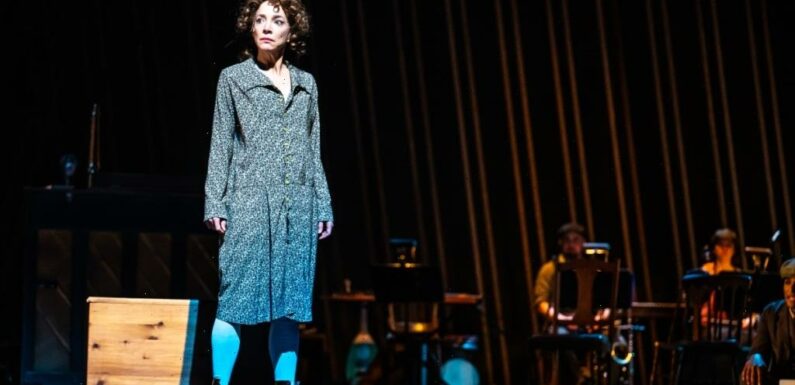
If nothing else, you’ve got to admire the epic scope and ambition of “Fall on Your Knees,” a two-part, six-hour adaptation of one of the most beloved Canadian novels of all time – Ann-Marie MacDonald’s sweeping saga about several generations of a Cape Breton family from the 1900s to mid-1960s.
After its Toronto premiere, “Fall on Your Knees” packs its bags and travels across Eastern Canada to Halifax’s Neptune Theatre (Feb. 10-March 5), Ottawa’s National Arts Centre (March 8-25) and finally London, Ontario’s Grand Theatre (March 29-April 2). Such a schedule is unprecedented for a new and unproven play, but MacDonald’s novel — which was included in Oprah’s Book Club in 2002 — has tens of thousands of fans who remember the book fondly.
Those fans will likely be content watching the story unravel, scene by laborious scene, even if people unfamiliar with the source material might be scratching their heads and shifting in their seats.
Part One, subtitled “Family Tree,” begins with the story of self-made Cape Bretoner James Piper (Tim Campbell), a burly, imposing piano tuner who, at age 19, falls in love with the 12-year-old Materia (Cara Rebecca), who comes from a strict Lebanese-Canadian family and is promptly disowned by her family.
Materia, who desperately wants a son to please her estranged father, gives birth instead to three daughters in the remote New Waterford: the vivacious and musically gifted Kathleen (Samantha Hill), the devout and responsible Mercedes (Jenny L. Wright) and the rebellious firebrand Frances (Deborah Hay). Over the course of their marriage, James grows increasingly distant from his wife, although he feels an unnatural attraction to his daughters, especially Kathleen, who, after he returns home battle-scarred from World War I, he sends down to New York City to study singing.
The mystery of what happens to Kathleen in New York, and why James brings her back, pregnant, to Cape Breton, hangs over the book and play and provides the narrative engine for the work’s second part, subtitled “The Diary.”
What kept readers turning pages was MacDonald’s dazzling, poetic prose and the artful way she hinted at the family’s closetful of secrets. Onstage, however, we merely get plot points that feel checked off rather than organic, and characters who, because they have never been properly established, largely remain ciphers going through motions. A subplot about a Black couple in New Waterford, Leo (Tony Ofori) and Adelaide Taylor (Janelle Cooper), feels especially underdeveloped here.
What adapters Alisa Palmer (who also directs) and Hannah Moscovitch (credited with the script) have successfully done, however, is emphasize certain elements that give the show some thematic through lines and consistency. The two evoke the toxic patriarchal systems in place in both the Piper household and the one Materia grew up in under her strict Lebanese father, Mr. Mahmoud (Antoine Yared). James’s physical violence, which is merely one element of his more sympathetic portrait in the book, is ratcheted up in the stage version. Campbell’s threatening presence, Anita Nittoly’s fight choreography and the realistic effects by sound designer Brian Kenny ensure his violent actions land with brutal force.
Music forms one of the overarching themes of both the book and the play, and without it the two-part production would be unwatchable. Under music supervisor Sean Mayes, a dozen or so songs — whether performed in Sydney speakeasies, Harlem nightclubs or classical music rehearsal studios — help mix up the show’s rhythms and moods. There’s also a musical motif in Camellia Koo’s otherwise minimal set that suggests the action is playing out under the taut strings of a grand piano.
But consistent themes, convincing depictions of violence and a few lively musical numbers aren’t enough to fill six hours. What’s lacking is a sense of theatricality, something that amounts to more than a mere accretion of scenes and incidents. (More than once I thought to myself, “Why a play and not a miniseries?” Moscovitch, a writer on AMC’s hit “Interview with the Vampire” adaptation, could have penned a pretty decent one.)
The performers do their best to breathe life into their underdeveloped characters. Wright brings dignity and stoicism to the long-suffering, responsible sister Mercedes, getting to show off range as a jaded New Yorker in the play’s second part. Janelle Cooper proves she’s a force of nature as Adelaide, a Black woman whose life intersects with both the Mahmouds and the Pipers, and Sweet Jessie Hogan, an extroverted Harlem blues singer.
Campbell’s hulking James doesn’t have much of an arc to play, but his ability to go from amiable Maritimer to sinister abuser is deeply effective. Amaka Umeh brings authority and confidence to a key character in Part Two, and Diane Flacks provides some much-needed comic relief as a helpful Jewish neighbor, a well-meaning nun in small-town Nova Scotia and a kindly aunt with a few secrets of her own in Greenwich Village.
But it’s Hay, a veteran of both the Stratford and Shaw Festivals, who delivers the most vivid, memorable performance as the guilt-ridden, self-destructive Frances. Intelligent, resourceful and quick with a snappy comeback, she tries in the only way she knows how to heal her family’s wounds. Frances is an archetypal lost girl – in the book, she’s obsessed with “Diary of a Lost Girl’s” Louise Brooks – but Hay makes her into something vital and alive.
Her performance, more than anything else about the play, will make you want to fall on your knees in admiration.
Read More About:
Source: Read Full Article